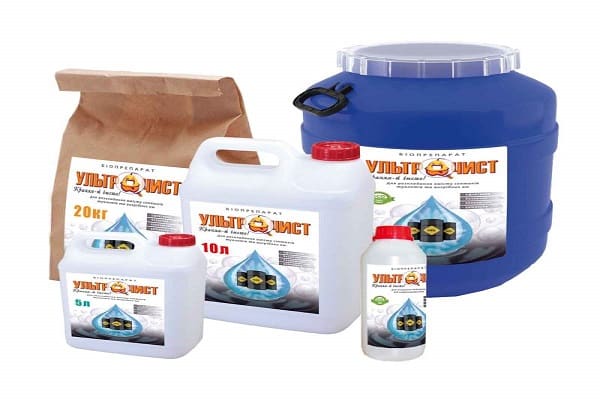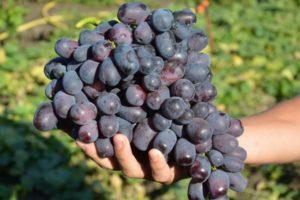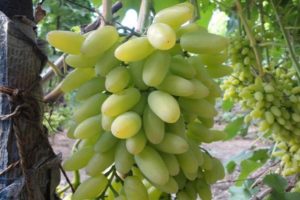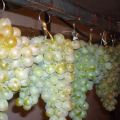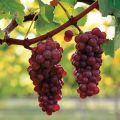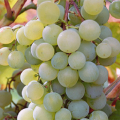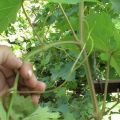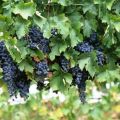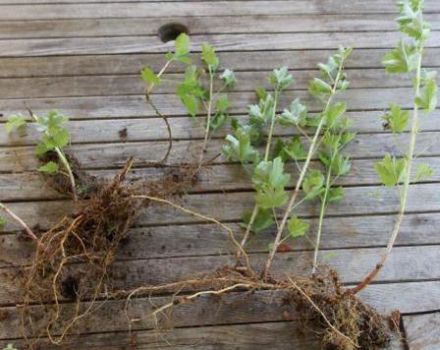What kind of soil is needed for planting grapes, the choice of the best and how to feed the soil
What kind of soil should be prepared for grapes - this is often asked by novice growers, amateurs and practicing gardeners. It depends on the soil mixture whether the seedling takes root or not, how quickly it adapts and grows. Dispel all doubts, as well as make the right choice, will help thematic material with advice from professionals.
Soil compliance criteria for planting grapes
Even experienced gardeners can make mistakes when it comes to the factors that influence the development of a wine berry. Surely they will call:
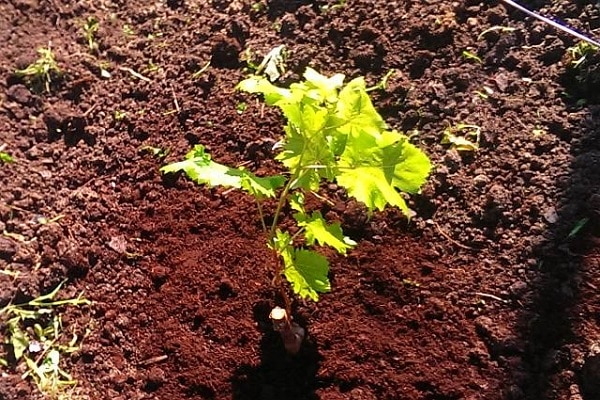
- variety and its individual characteristics (ripening period, disease resistance);
- climatic conditions for growing;
- top dressing - their presence and frequency;
- natural causes - air, light, watering.
But not everyone will remember the elementary - the composition of the soil, its acidity, saturation with minerals, fractional characteristics. And this also seriously affects the growth of the vine, its ability to bear fruit.
The subtlety lies in the fact that grapes do not need pure chernozem. A composite mixture of sand, humus, earth, sufficiently air and water permeable, is much better suited. Heavy, clayey soils are unacceptable. A place with a close occurrence of aquifers is also not suitable: this will lead to decay of the roots. Therefore, the growers go to the tricks, partially or completely replacing the land in the selected area with a carefully composed "cocktail" that will satisfy the needs of the fastidious vine.
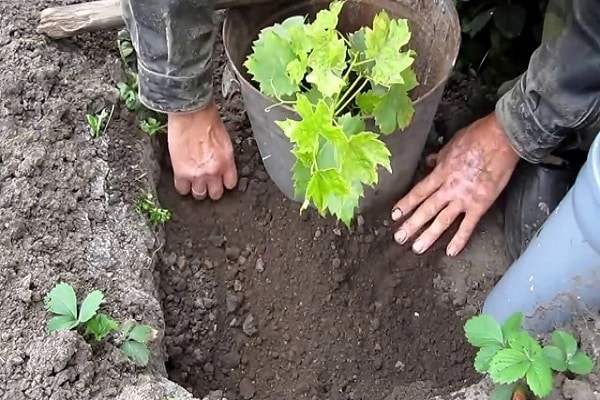
Qualitative composition
This is the saturation of the soil mixture with useful substances that the vine will need to form the root system, grow bunches and berries. Grapes need the following minerals (ideally they should be in the soil or have to be “added” as fertilizer):
- Nitrogen. The basis of growth. No nitrogen - shoots develop poorly. Oversaturation leads to a shift in the balance, weight gain of green mass to the detriment of the taste of the berry.
- Phosphorus.The second most important element affecting the vineyard is the rate of fruit ripening, a reduction in the growing season.
- Potassium. It affects the synthesis of carbohydrates - starch and sugars, therefore, with a lack of this component in the soil, the berries will be sour and tasteless. The presence of potassium is also associated with the frost resistance of the bush.
- Magnesium. Its role in the main process - the formation of chlorophyll - is undeniable. Without magnesium, foliage loses its natural green color, becomes withered and dead.
- Calcium. When there is enough, the roots grow in time, supporting the stem, and the berries are tasty and aromatic. An excess of calcium leads to disease of the bush (chlorosis).
- Iron. Also involved in the synthesis of chlorophyll in the leaves.
These are the main elements, but, besides them, there are auxiliary ones - sodium, aluminum, zinc. Therefore, for feeding grapes, experienced gardeners use complex, complex fertilizers.
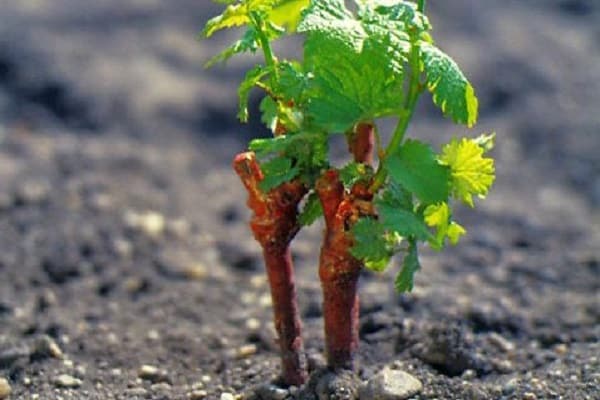
Acidity
The normal development of a seedling and an adult plant depends on the reaction of the soil, its acidity. Too acidic soil will have to be alkalized, not enough - acidified. In general, in such cases, they talk about the acidity balance, the pH indicator, which is determined by conducting a special analysis.
Correct pH
Each plant has its own requirements for acidity. Grapes are no exception. Potatoes and raspberries love an acidic environment; a corridor of 4-8 units has been experimentally established for a wine berry. The maximum value should not exceed 8.2, and even if the soil is not oversaturated with salts.
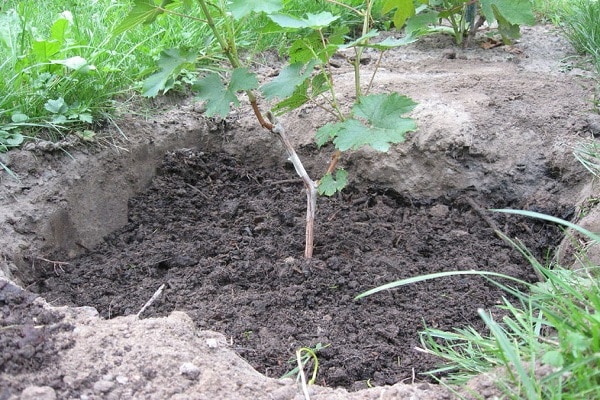
Indicator Plants
Certain plants that choose certain conditions will help determine the acidity of the environment. At the same time, it will become clear why some of them grow and prosper, while others wither. Sorrel, carrots, cucumbers, and flowers like irises and lilies like acidic soils. Moss, sedge or horsetail settle there. If the pH is low, this is evidenced by the rapid growth of gooseberries, blackberries, thuja.
Alkali content
For normal growth of grapes, a "correct" pH balance is needed, and not just an indicator with a bias in an acidic or alkaline environment. The neutral level (5.6-6.0) is determined by lettuce, apple, pear. It must be remembered that many plants are able to adapt to the acidity of the environment, and some can correct it during the growth process. Clover and nettles grow on low-acid lands; on slightly alkaline - quinoa or mustard.
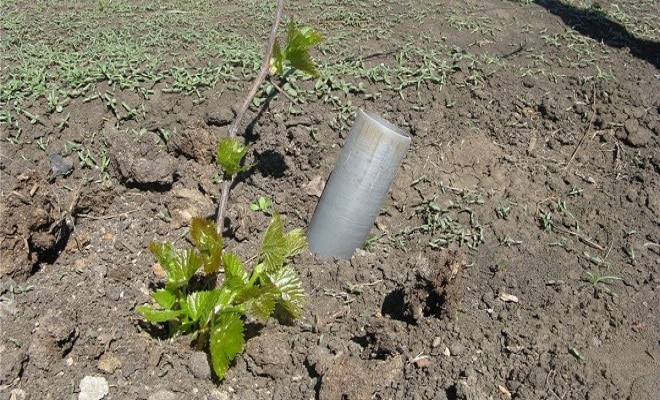
Humidity and tensiometer measurement
More than the presence of nutrients in the soil, only soil moisture affects the growth of grapes. Rare varieties react normally to excessive moisture.
The wine berry prefers well-drained, dry mixtures. The moisture indicator is determined with a special device - a tensiometer. To learn how to use it, enthusiasm alone will not be enough. It is better to roughly know the groundwater level and regulate soil moisture by irrigation.
Characteristics of the soil depending on the method of seating
Before planting grapes in one way or another, determine the place, the composition of the soil, its moisture and fertilization. For cuttings and seedlings, it will be different.
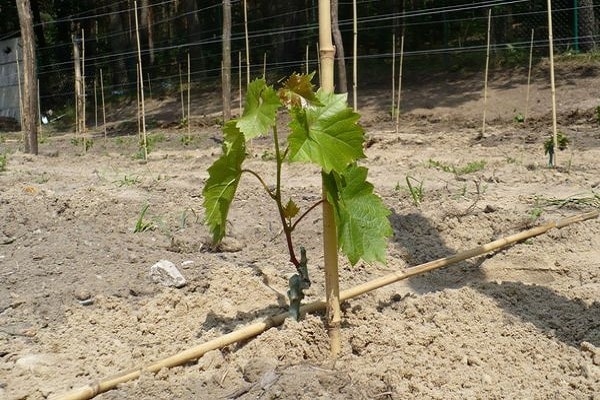
For cuttings
For planting cuttings in cups or pots, mixtures are prepared according to the following "recipes":
- About 1 part of humus, the same amount of sod and sawdust, half of the sand.
- Peat and stale (not fresh) manure taken in equal proportions.
For seedlings
The soil for seedlings is prepared according to different methods, but they begin to do this in the fall: they dig up, loosen, fertilize, remove old plants (if there were sick, it is better not to plant grapes in such a place to avoid infection).
For better drainage, crushed stone is added to the soil under an already planted bush, for seedlings, material of a large fraction is placed at the bottom of the dug hole - stones, bricks, sometimes pieces of tubes with holes are dug in to supply water and fertilizers to the roots through them. Depending on the composition of the soil, it can be "diluted" with sand, mixed with peat or humus.
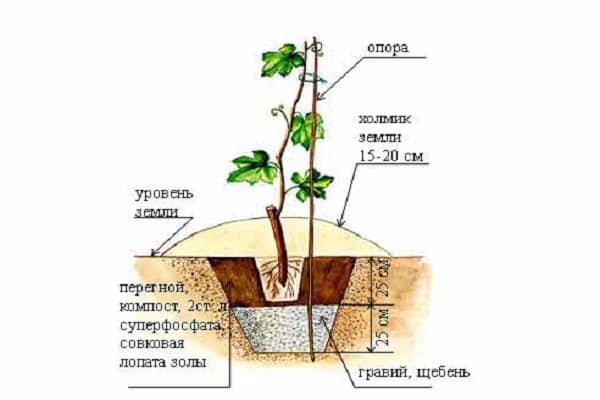
For layering
Layers on grapes are carried out from an already mature plant; special preparation is not required, since the same soil is used. Depending on the chosen technique, a trench is dug, a vine or a fresh shoot is placed in it, and sprinkled with earth.At the same time, it is allowed to add peat, compost, mulch the planting.
Under the shanks
It is best to start preparing in the fall: this way the earth will settle and be saturated with fertilizers. Digging is mandatory, but without fanaticism, so as not to grind the soil to a state of sand. You can add mineral fertilizers or organic matter (ordinary manure).
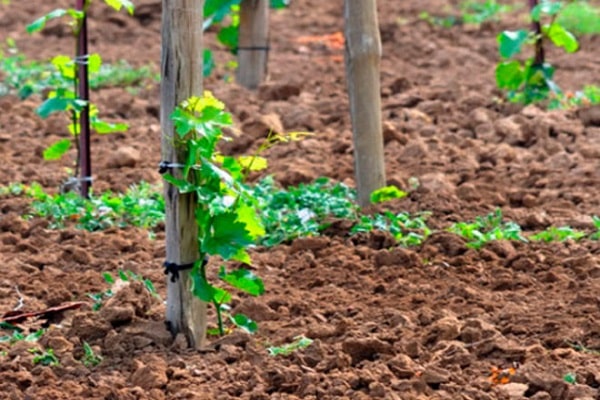
Each experienced grower has his own technique, for example, this: when digging a hole, the earth from it is divided into an upper and a lower layer. Next, the "top" is mixed with humus and again placed in the hole, then adding the remaining "lower" soil.
It is recommended to use any large fragments - bricks, stones, rubble. They will increase the permeability to air and water, which is so important for grapes.
When grown from seed
Growing from a bone is one of the most difficult ways. It will require a well-fertilized, pH-balanced soil (you can take a ready-made earthen mixture for flowers). Peat, dosed mineral fertilizers are welcome. The main task is to maintain the required level of humidity and temperature.

For adult bushes
The transplant itself is a serious shock for the bush, it is not advised to perform it unless absolutely necessary, with old plants. It is better to think over other options, but if transplantation is inevitable, then the soil is prepared a month before the procedure, in the fall.
There is nothing new in this: digging, feeding, watering. An autumn transplant is preferable, since the bush will grow in winter, under the snow, and by the spring it will certainly get stronger and take root in a new place.
For growing different varieties
As such, there is no soil type selectivity in different species - grapes need a drained, moderately acidic, dry soil containing potassium, nitrogen and phosphorus. There are doubts about the choice of soil for a specific variety - it is better to check with the seller of the seedling or familiarize yourself with the material yourself, having studied the thematic materials.
Land preparation
Careful selection of the planting site, soil mix account for 80% of success. Even the strongest seedling will not grow on poor, clayey, too wet soil. Therefore, experienced gardeners use soil replacement (full or partial) even in difficult conditions to compensate for the disadvantages of natural conditions.
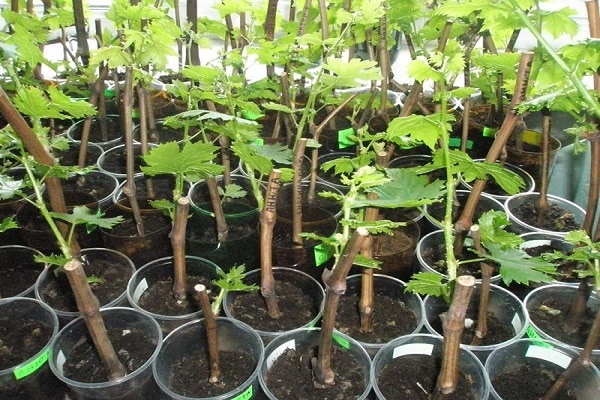
For open ground
The simplest methods of fertilizing the soil are no less effective than the complex ones. It is enough to add organic matter to the soil - compost, humus, use mulching, feed with ash to lay the foundations for the growth of the vine.
Manure of cattle or birds must be fermented and matured so that it does not burn the delicate roots of grapes. In the case of compost, grass, leaves, small branches, fruit residues and kitchen waste are sequentially placed in the pit, and after a few years, a ready-made complex fertilizer of home production is obtained.
Substrate for greenhouses and greenhouses
In cold climates, to accelerate the growth of seedlings, they are grown in a greenhouse. To do this, use a ready-made substrate bought in agricultural stores or mixed independently. In the first case, you do not need to worry about the pH level, the presence of minerals - they are already there. Otherwise, there will be painstaking work to add peat, humus, thorough mixing and distribution of the soil over the greenhouse.
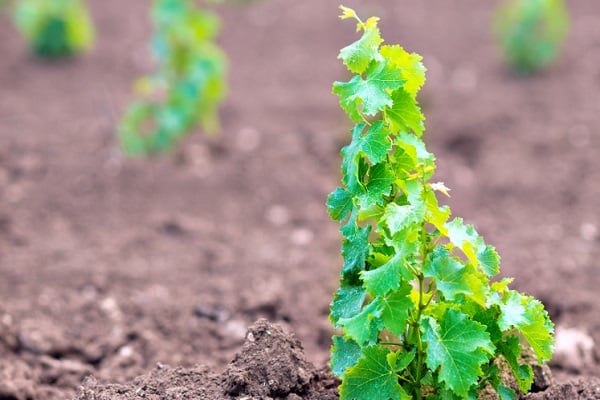
For disembarkation on balconies
The ideal option is to plant ornamental grapes in a soil mixture, which is sold in shops for growing indoor plants: it has a balanced composition, at the same time you can choose the desired acidity indicator.
Improving soil quality in different seasons
Not everyone is equally lucky - someone has to laboriously enrich the land on their site in order to create the required conditions for the vine. But this is also possible.
In the spring
There is a season for each top dressing.In the spring, the first digging after the cold season is carried out, mineral complexes containing nitrogen and its derivatives are added.
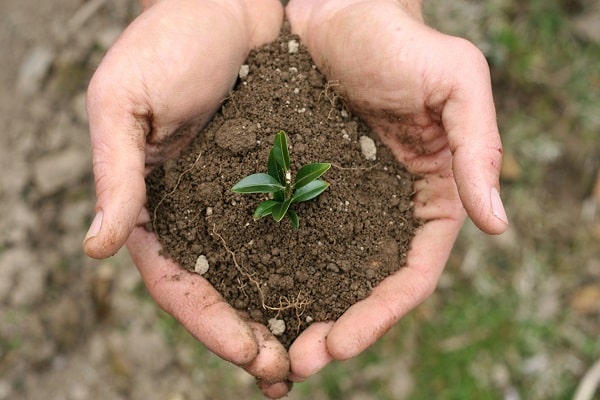
Summer
Sometimes they loosen the soil with hot water, remove weeds, apply nitrogenous fertilizers, and use foliar dressing.
In autumn
At this time, they dig up the soil, remove the damaged parts of the plant, add potassium mineral complexes. At the same time, manure, compost and mulch are introduced - this way they are better absorbed by the plant.
What to look for when choosing a soil
When deciding on a site for planting vines, they notice which indicator plants grow there, how deep the groundwater lies. The vine will reach the lower moisture-bearing horizons by itself, letting out long roots, in the case of a surface arrangement, the situation is worse. A drainage device, a drainage device, or other location may be required.
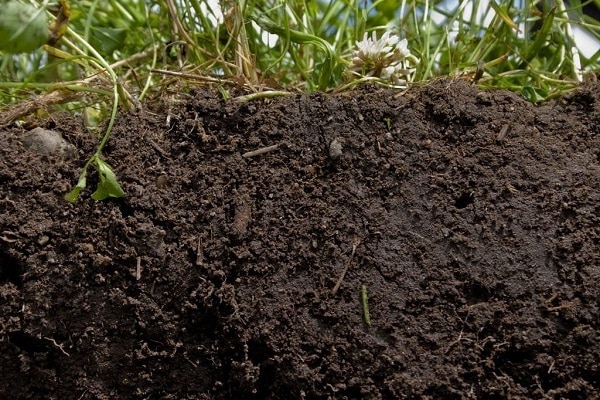
Fertilizing the earth
Grapes are in dire need of nitrogen, potassium and phosphorus - the growth of the vine and the taste of the berry depend on it. You can fertilize the land with the help of simple improvised methods.
Manure
Cow humus is a wonderful organic fertilizer. It is only important not to overdo it, add humus in a dosage and better in autumn than in spring. Experts advise to use horse manure, but apply it every 2-3 years.
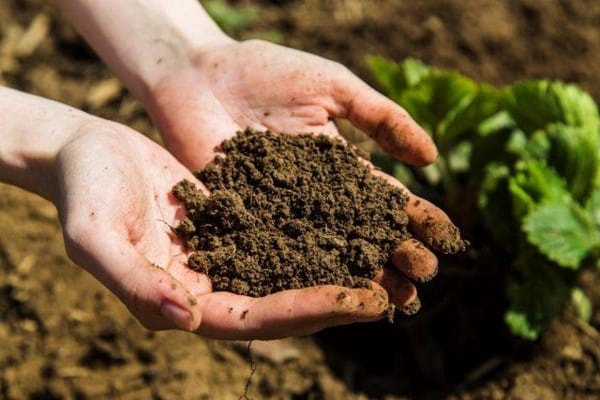
Bird droppings
Bird guano can compete with other organic substances in its balanced composition, but there is one subtlety: due to its high energy value, the droppings must necessarily "burn out", so as not to burn the roots of the grapes. You can reduce the concentration by diluting it with water.
Compost
Organic fertilizer of natural origin. Prepared from leaves, food waste, herbs. A significant drawback is that such a complex takes a long time to prepare. It is brought in dosed, once a year, usually before winter.
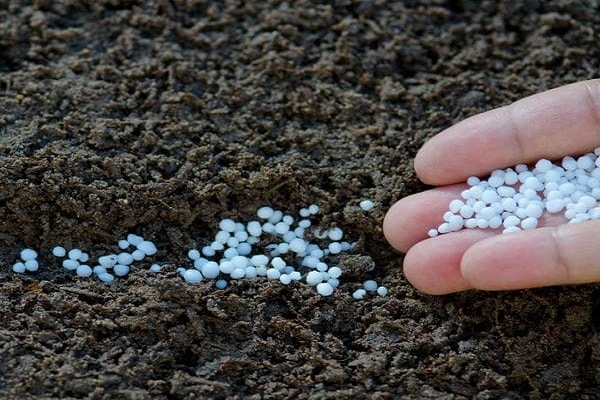
Eggshell
The shell contains an important mineral for grapes - calcium, which influences the ripening and taste of the berry. It is crushed, introduced into the soil in small portions, trying not to exceed the norm.
Yeast
Regular yeast helps balance the microflora balance. The method of preparation of top dressing is simple and straightforward: yeast (100 grams) is diluted in a bucket of warm water (10 liters), put overnight. One bush takes up to 2 liters of nutrient solution.
Mulch
Mulching helps to preserve moisture and nutrients in the soil. To do this, after planting and watering the seedling, the root zone is covered with small branches, straw, foliage, a layer of up to 5-7 centimeters. Such protection is said to inhibit weed growth.
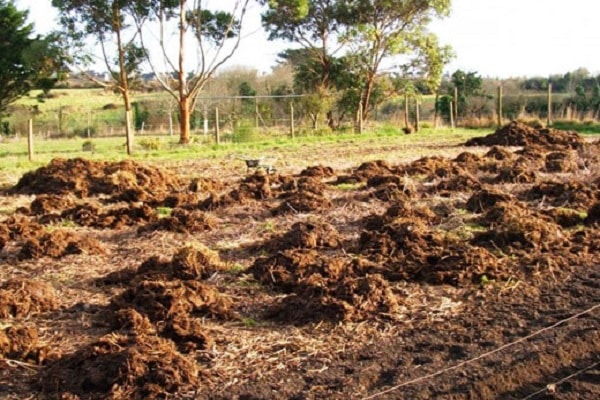
Sawdust
Ordinary sawdust can play a double role - mulch the soil and, over time, turn into fertilizer, rotate to nourish the soil with useful substances.
Care
Care measures for the planted vine are timely watering, treatment with chemicals from diseases and pests, feeding and shelter for the winter.
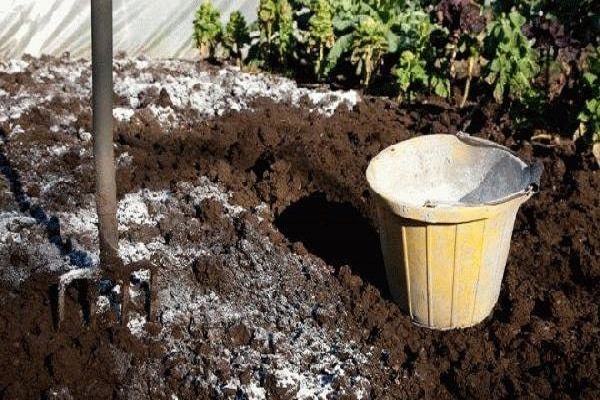
Disinfection
It is carried out in the spring or several times during the summer season, for prevention. Use drugs to destroy insects, pathogens, spraying grapes with a garden spray.
Protection
Some varieties are actively eaten by wasps, birds - effective protection of the future harvest is needed. For this, traps, insecticides, special nets or caps are used. In the case of protection against common garden diseases, spraying with Bordeaux liquid, complex drugs is used.
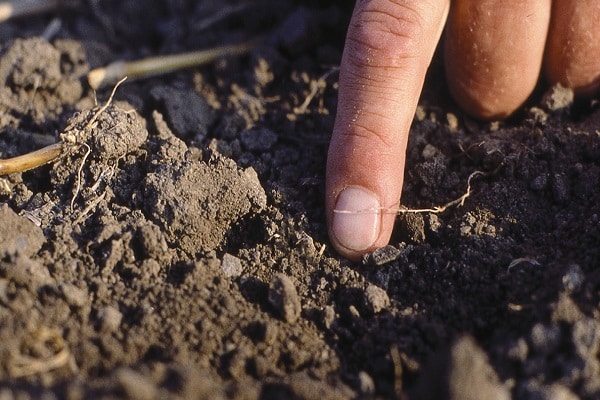
Recovery
To push the bush after a long winter period, to make it grow more actively, pruning of dead areas and the formation of sleeves are widely used. For some varieties, due to the abundance of rapidly growing stepchildren, this is an extreme, but necessary measure.
Biologicals
They serve as an alternative where chemistry is not effective or cannot be applied. They are based on special strains of biocultures that suppress the activity of gray mold, mildew, fungi.Absolutely harmless to humans: processed fruits can be eaten without fear of poisoning (unlike pesticides).
